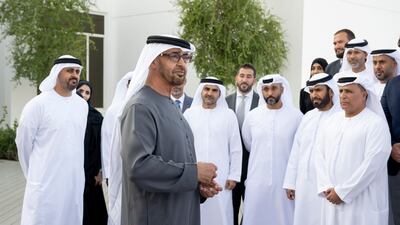President Sheikh Mohamed met the team of Etihad Rail at the Qasr Al Bahr Majlis on Tuesday.
The team was accompanied by Sheikh Theyab bin Mohamed, member of the Abu Dhabi Executive Council and chairman of Etihad Rail.
During the meeting, Sheikh Mohamed listened to the team's experiences working on the project, including the challenges they faced.
He praised their hard work over the past five years and said the railway network meets the highest international standards in sustainability.
Sheikh Mohamed said the launch of the freight train network marks a new stage in the development of the country.
“The national railway system and the start of freight train operations have boosted our domestic economy, signalling the start of a new phase in our nation's development, prosperity, the well-being of its people and the happiness of everyone who lives on the UAE soil,” he said.
The team said they were proud of working on the project and enjoyed it thoroughly.
On February 23, Sheikh Mohammed bin Rashid, Vice President and Ruler of Dubai, officially opened the UAE's freight train network.
The network consists of a fleet of 38 locomotives and more than 1,000 wagons capable of transporting all types of goods.
It will connect four major ports and seven logistics centres across the country.
The network also includes a number of charging stations located in Ruwais, the Industrial City of Abu Dhabi, Khalifa Port, Dubai Industrial City, Jebel Ali Port, Al Ghail and Fujairah Port.
The network, which runs across different geographical terrain, includes 593 bridges and crossings, and nine tunnels.
The freight trains have a capacity of transporting 60 million tonnes of goods per year and can run up to 120kph.
The project is expected to contribute Dh200 billion to the national economy by 2050, save Dh8 billion in road maintenance costs and provide Dh23 billion in tourism revenue.

